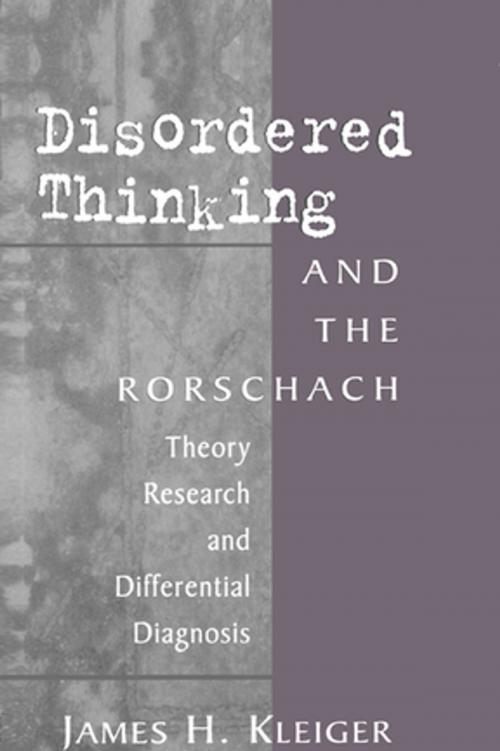Disordered Thinking and the Rorschach
Theory, Research, and Differential Diagnosis
Nonfiction, Health & Well Being, Psychology, Pathological Psychology, Applied Psychology, Mental Health| Author: | James H. Kleiger | ISBN: | 9781135828714 |
| Publisher: | Taylor and Francis | Publication: | April 15, 2013 |
| Imprint: | Routledge | Language: | English |
| Author: | James H. Kleiger |
| ISBN: | 9781135828714 |
| Publisher: | Taylor and Francis |
| Publication: | April 15, 2013 |
| Imprint: | Routledge |
| Language: | English |
In Disordered Thinking and the Rorschach, James Kleiger provides a thoroughly up-to-date text that covers the entire range of clinical and diagnostic issues associated with the phenomenon of disordered thinking as revealed on the Rorschach. Kleiger guides the reader through the history of psychiatric and psychoanalytic conceptualizations of the nature and significance of different kinds of disordered thinking and their relevance to understanding personality structure and differential diagnosis. He then moves on to thorough reviews of the respective contributions of David Rapaport, Robert Holt, Philip Holzman, and John Exner in conceptualizing and scoring disordered thinking on the Rorschach. These synopses are followed by an equally fascinating examination of less well known research conceptualizations, which, taken together, help clarify the basic interpretive conundrums besetting the major systems.
Finally, having brought the reader to a full understanding of systematic exploration to date, Kleiger enters into a detailed analysis of the phenomenological and psychodynamic aspects of disordered thinking per se. Even experienced clinicians will find themselves challenged to reconceptualize such familiar categories as confabulatory or combinative thinking in a manner that leads not only to new diagnostic precision, but also to a richer understanding of the varieties of thought disturbances with their equally variable therapeutic and prognostic implications.
With Disordered Thinking and the Rorschach, Kleiger has succeeded in summarizing a wealth of experience pertaining to the rigorous empirical detection and classification of disordered thinking. Equally impressive, he has taken full advantage of the Rorschach as an assessment instrument able to capture the richness of personality and thus capable of providing a unique clinical window into those crucially important differences in the quality of thought that patients may evince.
In Disordered Thinking and the Rorschach, James Kleiger provides a thoroughly up-to-date text that covers the entire range of clinical and diagnostic issues associated with the phenomenon of disordered thinking as revealed on the Rorschach. Kleiger guides the reader through the history of psychiatric and psychoanalytic conceptualizations of the nature and significance of different kinds of disordered thinking and their relevance to understanding personality structure and differential diagnosis. He then moves on to thorough reviews of the respective contributions of David Rapaport, Robert Holt, Philip Holzman, and John Exner in conceptualizing and scoring disordered thinking on the Rorschach. These synopses are followed by an equally fascinating examination of less well known research conceptualizations, which, taken together, help clarify the basic interpretive conundrums besetting the major systems.
Finally, having brought the reader to a full understanding of systematic exploration to date, Kleiger enters into a detailed analysis of the phenomenological and psychodynamic aspects of disordered thinking per se. Even experienced clinicians will find themselves challenged to reconceptualize such familiar categories as confabulatory or combinative thinking in a manner that leads not only to new diagnostic precision, but also to a richer understanding of the varieties of thought disturbances with their equally variable therapeutic and prognostic implications.
With Disordered Thinking and the Rorschach, Kleiger has succeeded in summarizing a wealth of experience pertaining to the rigorous empirical detection and classification of disordered thinking. Equally impressive, he has taken full advantage of the Rorschach as an assessment instrument able to capture the richness of personality and thus capable of providing a unique clinical window into those crucially important differences in the quality of thought that patients may evince.















